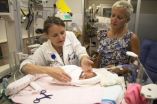(Press-News.org) A 40-year-old California man exhibits normal cognitive function although he has no apolipoprotein E (apoE), which is believed to be important for brain function but a mutation of which is also a known risk factor for Alzheimer disease (AD). Researchers suggest this could mean that therapies to reduce apoE in the central nervous system may one day help treat neurodegenerative disorders such as AD.
The study was authored by Angel C. Y. Mak, Ph.D., of the University of California, San Francisco, and colleagues.
The patient was referred to UCSF with severe high cholesterol that was relatively unresponsive to treatment. He has a rare form of severe dysbetalipoproteinemia (abnormally high levels of cholesterol and triglycerides in the blood) and the authors identified a mutation leading to his apoE deficiency.
Extensive studies of the patient's retinal (eye) and neurocognitive function were performed because apoE is found in the central nervous system and the retinal pigment epithelium of the eye.
Results: Despite lacking apoE, the patient had normal vision and exhibited normal cognitive, neurological and eye function. The patient also had normal brain imaging findings and normal cerebrospinal fluid levels of other proteins.
"Failure of detailed neurocognitive and retinal studies to demonstrate defects in our patient suggests either that the functions of apoE in the brain and eye are not critical or that they can be fulfilled by a surrogate protein. Surprisingly, with respect to central nervous system function, it appears that having no apoE is better than having the apoE4 protein. Thus, projected therapies aimed at reducing apoE4 in the brain could be of benefit in neurodegenerative disorders such as Alzheimer disease."
In a related editorial, Courtney Lane-Donovan, S.B., and Joachim Herz, M.D., of the University of Texas Southwestern Medical Center, Dallas, write: "More than 20 years ago, a polymorphism in the apolipoprotein E (apoE) gene was identified as the primary risk factor for late-onset Alzheimer disease (AD). Individuals carrying the Ɛ4 isoform of apoE (apoE4) are at significantly greater risk for AD compared with apoE3 carriers, whereas the apoE2 allele is associated with reduced AD risk."
"Despite two decades of research into the mechanisms by which apoE4 contributes to disease pathogenesis, a seemingly simple question remains unresolved: is apoE good or bad for brain health? The answer to this question is essential for the future development of apoE-directed therapeutics. … In light of apoE as the primary risk factor for AD, the lack of neurological findings in this patient would appear to answer the question of whether apoE is necessary for brain function with a resounding no," they continue.
"Overall, the patient's normal cognitive function together with the earlier mouse work suggest that interventions that reduce cerebral apoE levels may hold promise as a potential therapeutic approach to AD," they conclude.
INFORMATION:
JAMA Neurol. Published online August 11, 2014. doi:10.1001/.jamaneurol.2014.2011..
JAMA Neurol. Published online August 11, 2014. doi:10.1001/.jamaneurol.2014.2013
Authors disclosed a variety of funding/support sources. Please see the article for additional information, including other authors, author contributions and affiliations, financial disclosures, funding and support, etc.
The authors made funding disclosures. Please see the article for additional information, including other authors, author contributions and affiliations, financial disclosures, funding and support, etc.
To contact corresponding author Mary J. Malloy, M.D., call Laura Kurtzman at 415-476-3163 or email Laura.Kurtzman@ucsf.edu. To contact editorial author Joachim Herz, M.D., call Gregg Shields at 214-648-3404 or e-mail Gregg.shields@utsouthwestern.edu
Normal cognition in patient without apolipoprotein E, risk factor for Alzheimer's
2014-08-11
ELSE PRESS RELEASES FROM THIS DATE:
Bisphosphonates for osteoporosis not associated with reduced breast cancer risk
2014-08-11
An analysis of data from two randomized clinical trials finds that three to four years of treatment with bisphosphonates to improve bone density is not linked to reduced risk of invasive postmenopausal breast cancer.
The authors are Trisha F. Hue, Ph.D., M.P.H., of the University of California, San Francisco, and colleagues.
Some studies have suggested that bisphosphonates, which are commonly used to treat osteoporosis, may have antitumor and antimetastatic properties. Some observational studies have suggested bisphosphonates may protect women from breast cancer. ...
Medicinal oil reduces debilitating epileptic seizures associated with Glut 1 deficiency
2014-08-11
DALLAS – Aug. 11, 2014 – Two years ago, the parents of Chloe Olivarez watched painfully as their daughter experienced epileptic seizures hundreds of times a day. The seizures, caused by a rare metabolic disease that depleted her brain of needed glucose, left Chloe nearly unresponsive, and slow to develop.
Within hours, treatment with an edible oil dramatically reduced the number of seizures for then-4-year-old Chloe, one of 14 participants in a small UT Southwestern Medical Center clinical trial.
"Immediately we noticed fewer seizures. From the Chloe we knew two years ...
An easier way to manipulate malaria genes
2014-08-11
Plasmodium falciparum, the parasite that causes malaria, has proven notoriously resistant to scientists' efforts to study its genetics. It can take up to a year to determine the function of a single gene, which has slowed efforts to develop new, more targeted drugs and vaccines.
MIT biological engineers have now demonstrated that a new genome-editing technique, called CRISPR, can disrupt a single parasite gene with a success rate of up to 100 percent — in a matter of weeks. This approach could enable much more rapid gene analysis and boost drug-development efforts, says ...
Kessler Foundation scientists link environment & inclusion in adults with disabilities
2014-08-11
West Orange, NJ. August 11, 2014. Kessler Foundation researchers have identified an association between the built environment and disability-related outcomes for adults with physical impairments. The article, Disability and the built environment: an investigation of community and neighborhood land uses and participation for physically impaired adults, was published in the July issue of Annals of Epidemiology (doi: 10.1016/j.annepidem.2014.05.003). The authors are Amanda Botticello, PhD, MPH, and Nicole Cobbold, BS, of Kessler Foundation, and Tanya Rohrbach, MS, of Raritan ...
A global temperature conundrum: Cooling or warming climate?
2014-08-11
MADISON, Wis. — When the Intergovernmental Panel on Climate Change recently requested a figure for its annual report, to show global temperature trends over the last 10,000 years, the University of Wisconsin-Madison's Zhengyu Liu knew that was going to be a problem.
"We have been building models and there are now robust contradictions," says Liu, a professor in the UW-Madison Center for Climatic Research. "Data from observation says global cooling. The physical model says it has to be warming."
Writing in the journal Proceedings of the National Academy of Sciences today, ...
Follow the radio waves to exomoons, UT Arlington physicists say
2014-08-11
Scientists hunting for life beyond Earth have discovered more than 1,800 planets outside our solar system, or exoplanets, in recent years, but so far, no one has been able to confirm an exomoon. Now, physicists from The University of Texas at Arlington believe following a trail of radio wave emissions may lead them to that discovery.
Their recent findings, published in the Aug. 10 issue of The Astrophysical Journal, describe radio wave emissions that result from the interaction between Jupiter's magnetic field and its moon Io. They suggest using detailed calculations about ...
Digoxin tied to increased risk of death in patients with atrial fibrillation
2014-08-11
In An Account of the Foxglove and Some of its Medical Uses, published in 1785, Sir William Withering cautioned readers that extracts from the plant foxglove, also called digitalis, was not a perfect drug. "Time will fix the real value upon this discovery," he wrote.
Now, more than 200 years later, researchers at the Stanford University School of Medicine have validated Withering's warning with the discovery that patients with atrial fibrillation — a rapid and irregular heart rhythm — who are treated with the digitalis-derivative digoxin are more likely to die than similar ...
Bioengineers make functional 3-D brain-like tissue model
2014-08-11
MEDFORD/SOMERVILLE, Mass. (August 11, 2014) --The human brain remains one of the least understood organs in the human body, because of its complexity and the difficulty of studying its physiology in the living body. Tufts University researchers today announced development of the first reported complex three-dimensional model made of brain-like cortical tissue that exhibits biochemical and electrophysiological responses and can function in the laboratory for months. The engineered tissue model offers new options for studying brain function, disease and trauma, and treatment. ...
Trapped atmospheric waves triggered more weather extremes
2014-08-11
It has been linked to a recently discovered mechanism: the trapping of giant waves in the atmosphere. A new data analysis now shows that such wave-trapping events are indeed on the rise.
"The large number of recent high-impact extreme weather events has struck and puzzled us," says Dim Coumou, lead author of the study conducted by a team of scientists from the Potsdam Institute for Climate Impact Research (PIK). "Of course we are warming our atmosphere by emitting CO2 from fossil fuels, but the increase in devastating heat waves in regions like Europe or the US seems ...
Preemies' gut bacteria may depend more on gestational age than environment
2014-08-11
Scientists believe babies are born with digestive systems containing few or no bacteria. Their guts then quickly become colonized by microbes — good and bad — as they nurse or take bottles, receive medication and even as they are passed from one adoring relative to another.
However, in infants born prematurely, researchers at Washington University School of Medicine in St. Louis have found that the population of bacteria in babies' gastrointestinal tracts may depend more on their biological makeup and gestational age at birth than on environmental factors. The scientists ...




